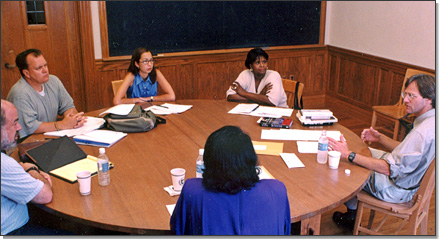A Three-Way Partnership

by Verna Arnold
When I responded to a school district posting for a summer position to work in collaboration with a local college and a university to develop a new program for teachers, I did not know that I was to embark upon an experience that would be the most significant highlight of my professional career. In the summer of 1998 two colleagues and I were selected to serve on a planning team to assist Dr. Helen S. Faison, the Chair of the Chatham College Education Department, prepare an application for an Implementation Grant from Yale University to become a demonstration site of the professional development model that had been established between Yale and the New Haven Public Schools 20 years before. As part of our work we traveled to Yale to participate in a July Intensive Session. We knew that there would be meetings to define the work of the YNHTI and the policies and procedures that were to be followed if we were successful in receiving a grant, but the actual hands-on experience of participating in a seminar was the most rewarding surprise of the trip and my professional career at that point.
I chose to participate in a seminar on Astronomy that was led by a professor who had actually worked with NASA. To think that I was at the historic Yale University participating in an abbreviated seminar on a topic that most would consider high above the intellect of kindergarten-to-third-grade students! Yet I attended eight sessions, researched the topic using the vast resources of the University, and completed a curriculum unit that I was able to use in my primary science classroom the next fall.
I came away from that experience on a professional high! All of us in the Session had experienced at first hand how engaging in relevant conversations and exchanging suggestions and ideas on teaching and learning with colleagues from every level of instruction could be intellectually stimulating. Energized as professionals, we left with increased hope that we might become highly qualified teachers committed to providing our students with accurate and meaningful instruction. We agreed that any teacher who could engage in this level of professional development would feel re-energized to do the work of their chosen craft.
When the Pittsburgh Teachers Institute was established, I participated in one of the four seminars that it first offered, and then traveled to Yale for a second July Intensive Session in 1999. This enabled me to complete a two-part curriculum on Energy. Both seminar experiences had left me with a feeling of great satisfaction with the new knowledge that I had gained and a desire for more professional development of this caliber.
When I entered the ranks of school administrators in the fall of 1999, I became ineligible to be a seminar Fellow. I now consider myself a PTI cheerleader. In that role I have had the opportunity to speak before school district representatives and local funders about the great work of not just the Pittsburgh Institute but all the Teachers Institutes. I share my experience yearly with the teaching staff under my administration and have succeeded in encouraging many of them to participate in PTI.
In the face of No Child Left Behind all school districts are confronted with the task of improving the quality of instruction for all students. Teacher practices are being closely scrutinized for effectiveness; teachers must demonstrate that they know and understand the content of their subject area; and they must know how to connect student learning to everyday life making their instruction meaningful. Teachers must get better at understanding and assessment, and they need to know that assessment should be embedded in every learning experience.
What school districts and community stakeholders must understand is that teachers get better and more effective through ongoing and meaningful professional development as modeled in the Teachers Institutes. I will always be grateful for my experience with the New Haven and Pittsburgh Institutes. It was the most significant professional development experience of my career. It showed me that I did not want to settle for just being a good teacher, but I had the ability to be a great teacher. That Teachers Institute experience has stayed with me through my past five years as a school administrator and has helped me provide meaningful professional development for my faculty.
I would highly recommend to school districts that they seek local and national funding in order to establish partnerships with local universities and colleges that can bring about the professional development experiences that can only be provided by a Teachers Institute.
Verna Arnold is Principal at Fort Pitt Elementary School in Pittsburgh.
